That swimming pool sure feels good in the summer—until you get home and look in the mirror.
Eek!
Chlorine is used to kill bacteria in pools, and it does its job well, but it’s also a harsh chemical bleach that can wreak havoc on your skin and hair. When used in pools, it’s combined with other chemicals to make it generally safe, but over time it can still damage tissues and hair strands.
Fortunately, you don’t have to avoid swimming to protect yourself.
What Is Chlorine Used for?
Chlorine shows up in our lives in a lot of ways. It’s not only in swimming pools to disinfect the water, but it’s also used to sterilize drinking water and in the manufacturing of products like paper, textiles, paints and plastic, medicines, and more.
11 Surprising Ways to Protect and Prevent Sun Damage
Why Is Chlorine Dangerous? What's the Science Behind Chlorine?
The chemical is known as an “oxidizing” agent, meaning that it can oxidize other substances. That means it can encourage the formation of free radicals—those nasty molecules that damage cells, proteins, lipids, and DNA. Too much oxidation can lead to inflammation, disease, and aging.
Build Your Perfect Skin Care Regimen
Take QuizHow Does Chlorine Affect My Skin and Hair?
Knowing this, you can guess what chlorine does to your hair and skin. It not only robs both of natural moisturizers and oils, but it’s powerful oxidation processes—often called “corrosive”—can result in lasting damage that accentuates the appearance of fine lines and wrinkles. It also destroys vitamin E and essential fatty acids that the skin needs to appear its best.
Regular exposure to the chlorine in swimming pools can result in the following changes:
• Discolored hair
• Dry, brittle, straw-like hair that’s prone to breakage
• Frizzy hair
• Lack of shine to the hair
• Weak hair that lacks volume
• Dry, itchy scalp
• Damage to cuticles
• Weakened and breaking nails
• Dry, flaky skin
• Itchy, rashed, or burned skin
• Allergic or reactive skin (especially in sensitive skin types)
• Acne breakouts
• Accelerated aging in skin, showing up as fine lines and wrinkles
Obviously none of us want to experience any of these all these for an occasional dip in the pool!
How to Protect Skin and Hair From Chlorine in Swimming Pool
You don’t have to wind up with rough hair and dry skin just because you like to swim. Try the following tips to protect your hair and skin the next time you take a dip.
1. Outdoor Pool Swimming Leaving Less Chlorine on Your Skin and Hair
These allow gases from the chemicals in the water to escape into the air—leaving less to contaminate your hair and skin. These types of pools are also better for your eyes, sinuses, and lungs. If you need to swim indoors, look for well-ventilated pools.
2. Shower Before Swimming Let Skin and Hair Absorb Less Chlorine
Both hair and skin are less likely to absorb water from the pool once they’re already wet. Make sure you’re good and soaked right before you go in to increase resistance.
3. Apply Hair Oil or Conditioner to Protect Hair From Chlorine
Hair experts recommend that you apply either a deep conditioner or natural oil like coconut oil, to the hair before going into the pool. It creates a layer between your hair and the chlorine and other chemicals in the pool and helps nourish the hair follicles as well. If you use oil, however, be sure to wear a cap, or that you’re swimming in an indoor pool—otherwise the oil will attract sun damage if you’re outside.
4. Wear a Swim Cap to Prevent Hair From Chlorine
This is the best way to protect your hair, especially if it’s chemically treated. After you’ve showered and applied a conditioner or hair oil, put your cap on. Of course, you can wear a cap without washing your hair if you feel you have a quality one that will prevent all exposure, but for maximum chlorine resistance, it’s best to wash and condition first.
Pin your hair back. If you don’t want to wear a cap, at least pin your hair back to limit exposure.
5. Apply Lotion Before Swimming Keep Your Skin Safe From Chlorine
Like conditioner on your hair, lotion on your skin gives you an extra layer of protection. Apply sun protection if swimming outdoors and if swimming indoors apply an oil or lotion. You can try our body care lotion which is suitable for every skin type.
6. Shower After Swimming In Chlorine Pool to Get Rid Of Chlorine
Using a gentle, sulfate-free hair care product like our herbal shampoo, wash hair and skin after you swim to get rid of all those chemicals hanging around. Give hair a good soak in the water—a quick wash can leave some chlorine in the follicles. Let the freshwater flow through it for five minutes or so.
7. Rinse With Apple Cider Vinegar to Remove Chlorine From Hair
You can also use apple cider vinegar as a clarifying rinse—it will help get all those chemicals out of the hair strands, and will also remove dulling buildup. The nice thing about this natural substance is that it not only helps get rid of chlorine, but other damaging things found in pools like copper, salt, and various impurities and contaminants.
8. Skin Care and Hair Care for Swimming
Apply a protective, deeply moisturizing hair conditioner to your hair after washing, and be sure to apply a natural, deeply moisturizing oil or butter to your skin as soon as you step out of the shower.
9. Avoid Dryers If You Can to Prevent Hair Damage
Use a wide-toothed comb to remove tangles after washing, and then pat dry. Avoid using blow dryers if you can as that will limit damage to hair.
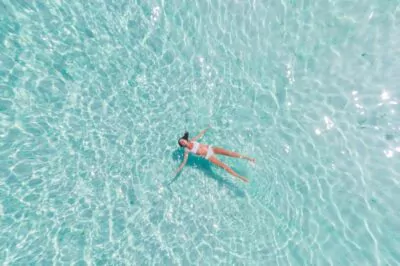

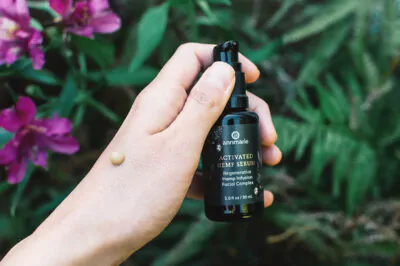
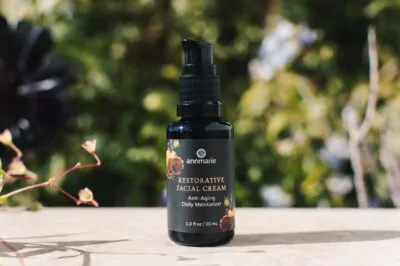
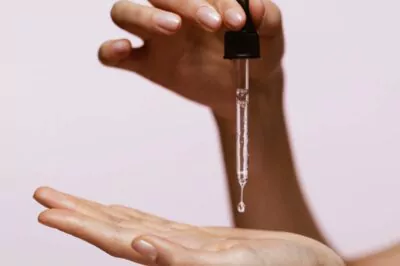
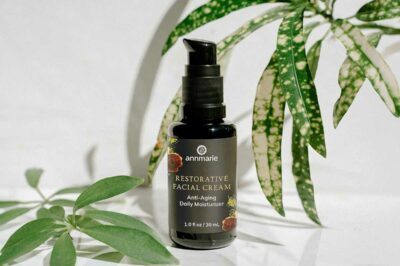


I used to rinse my hair with kombucha vinegar and it helped, but not as much as wetting my hair before swimming. That said, I may try the apple cider vinegar now that I’m no longer making my own kombucha. The combination of that and wetting my hair may really do the trick!
Thank you for this list–I love swimming laps as a break for my leg joints, but sometimes I avoid it because of the chlorine. It’s nice to have a lot of tools!
I spend 14 hrs in an indoor, heated hydrotherapy pool a week. It was wrecking my nails and my skin always smelt like chlorine even after I scrubbed myself in the shower. Someone suggested I use sodium ascorbate dissolved in some water and this has made a world of difference! I squirt it on myself after I get out of the pool and rinse it off. It neutralizes the chlorine almost instantly. As for my nails, I’ve started getting SNS to protect them and it’s working a treat!
Hi Joy–you definitely got my attention about rinsing skin in sodium ascorbate after swimming. I have two questions: 1)what ratio do you use of sodium ascorbate to water in your rinse minxture—example: a tsp Sodium ascorabate to 10 oz of water.
2) Do you rinse your hair with this mixture too?
* I am in a pool for PT and my skin burns afterwards even with showering afterwards. Anything that helps my skin would be so appreciated. Thanks!
I searched and found a site recommending 1tsp to 8 ounces distilled water.
What is/are SNS?
Very helpful, thank you
I have just recently started putting conditioner on my hair under my swimming cap thanks to a tip from a hairdresser who said it would help maintain the Keratin Smoothing treatment I had done. I think it is helping so I will continue to do so. I already try to follow the tips you have suggested except for number 2. I had no idea that wetting my skin and hair before getting in the water would mean less chemically treated water would be absorbed. It is such an easy thing to do and I will do that from now on. Thanks for the article.
I just started wetting my hair before swimming laps and it has made a huge difference! I usually use a leave-in conditioner the night before swimming, and that helped a bit but not nearly as much as wetting my hair does.
I have tried wetting and applying conditioner, then wear a swim cap. The only issue is that my swim cap slides off because my hair is slippery. Now I just wet the hair before swimming, rinse afterward and apply oil to the ends. Not sure if helping but I have to try something. The chlorine just destroys my hair color and leaves my hair like straw and frizzy,
Same here! My silicone swim cap popped right off after I put conditioner on my hair the other day. Today I’m just going to thoroughly wet my hair in the shower and wear my swim cap. Afterwards, I’ll thoroughly wash and deep condition it.
Thanks for the helpful article and all of the great comments/tips. Happy Swimming!!
I rarely swim in chlorinated pools, but the water in my house has high amounts of chlorine (confirmed with a water testing kit — but I can also see the cloudiness and smell it!). I do only use organic sulfate-free shampoos, and I also use a vinegar rinse, and I believe these do help, but what also helped was recently buying a new shower head with a built-in filter. I did a water test on that water after installing the new shower head, and it confirmed that the amount of chlorine was greatly reduced! It seems to be helping my skin and hair. There are several different good shower head filters on the market, and I think they’re worth investigating, if you haven’t thought of it before.